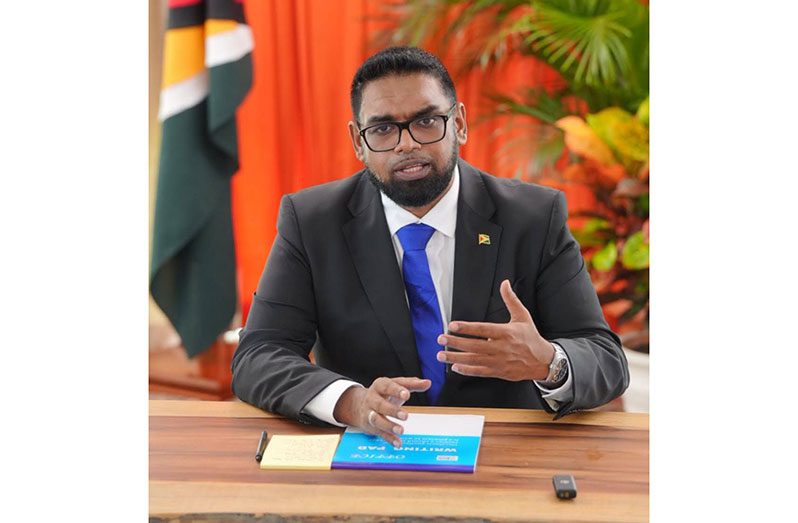~President Ali labels Venezuela’s recent action
~Maintains Guyana’s stance for peace – says country will protect its people and sovereignty
LABELLING Venezuela’s recent actions to assert claims over Guyana’s Essequibo territory as a blatant disregard for international law, President Dr. Irfaan Ali maintained that Guyana remains a state of peace and order.
The Guyanese Head of State, during an interview with Al Jeerza, a world news agency, affirmed the Guyanese stance; however, he noted that the country will do everything within its power under international law to protect its people and sovereignty.
“We want this region to remain a region of peace and stability; that is our foremost concern; that is our priority,” President Ali said.
Last Sunday, the Bolivarian Republic held a controversial referendum, seeking public ratification to claim the Essequibo Region, an area that accounts for two-thirds of Guyana’s territory and is rich in oil, gold and other resources.
Guyana initiated legal proceedings with the International Court of Justice (ICJ) in order to suspend the referendum, despite the court’s prior ruling that Venezuela should abstain from any activities that could impact Guyana’s control over the Essequibo region. However, the referendum was held.
Shortly after, Venezuela’s President Nicolas Maduro ordered the establishment of an administration to govern Guyana’s territory, claiming a massive supportive response from the referendum.
“The questions in the referendum sought to give Venezuela the authority to act in annexing the Essequibo region, setting up administrative mechanism, issuing ID [Identification Cards]. And the ICJ ruled overwhelming, unanimously that Venezuela must not act on the outcome of this referendum,” President Ali explained.
“This is a blatant disregard for international order, the order of the ICJ and international law,” he added.
PEACE
Guyana, President Ali said, began engaging all international and regional partners.
While many of these partners have spoken in defence of Guyana, President Ali is hoping that the United Nations Security Council will also issue a strong statement on the matter.
“We would like the United Nations Security Council to issue a very strong statement to Venezuela for breaching the order of the ICJ, an order that can be enforceable, and we would like to see the full commitment of the United Nations Security Council to ensure that they will do everything to have this region remain of peace and stability and for them to support international law.”
He noted Guyana is working with its allies in a precautionary manner to ensure that citizens are protected.
In 1897, Venezuela and Great Britain concluded an agreement — the Treaty of Washington — by which they agreed to submit the dispute regarding the location of their land boundary to binding arbitration before a tribunal of eminent jurists, including the heads of the judiciary of the United States and Great Britain. The parties — Britain and Venezuela — agreed in that Treaty to accept the Tribunal’s Award as ‘a full, perfect and final settlement’ of the boundary issue between the parties.
That ‘settlement’ was exactly 124 years old, and Guyana still accepts and celebrates the Arbitral Award as stipulated by the Treaty.
On October 3, 1899, the Arbitral Tribunal delivered its award, which determined the boundary between Venezuela and British Guiana (the 1899 Award). The 1899 Award was the culmination of arbitral proceedings during which the respective territorial claims of Great Britain and Venezuela were addressed at great length and in detail by distinguished legal counsel representing the two states, including through many thousands of pages of written submissions and more than 200 hours of oral hearings before the Arbitral Tribunal.


.jpg)











